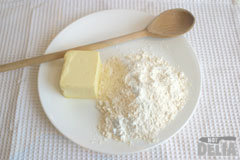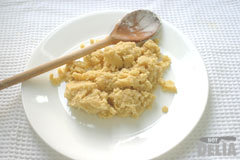What is roux and why is it important?
Roux is a cooked mixture of equal amounts of flour and fat – usually butter, although any edible fat could be used. It’s used to thicken sauces and gravies, and is the basis for many classic sauces such as Béchamel and velouté. You can also use it to make a basic white sauce, to which you can add various additional flavourings, if desired, such as parsley, mustard, cheese, onion. etc.
Now, why should you go to the bother of preparing a roux before making a sauce? After all, you can simply thicken a sauce with cornflour. Or for a simple white sauce you can add milk to the flour and fat and whisk like mad till it’s smooth. At first it seemed odd to me to add the roux to the milk rather than the other way around, but – believe me – you get a more professional result and taste by doing it this way. Plus it’s actually easier, in terms of needing less elbow grease. Give it a try!
How to make roux
Roux can be stored in a cool place and used as required so I find it better to make a larger quantity so that there’s always some on hand for when I need it. You can, of course, make up only the quantity required for any particular recipe.
Here’s a little photo-essay of me making roux:
 Here’s everything prepped up and ready to go.
Here’s everything prepped up and ready to go.
- 110g (4oz) butter
- 110g (4oz) white flour
 Melt the butter in a pan and add the flour. Combine the ingredients until the mixture loses its floury taste; this takes two or three minutes. Stir occasionally. It’s important to do this “cooking” process otherwise your sauce will taste of raw flour.
Melt the butter in a pan and add the flour. Combine the ingredients until the mixture loses its floury taste; this takes two or three minutes. Stir occasionally. It’s important to do this “cooking” process otherwise your sauce will taste of raw flour.
 After a few minutes the mixture will take on a drier consistency. Voilà! This is the roux which can form the basis of so many sauces.
After a few minutes the mixture will take on a drier consistency. Voilà! This is the roux which can form the basis of so many sauces.
Leave a Reply
You must be logged in to post a comment.